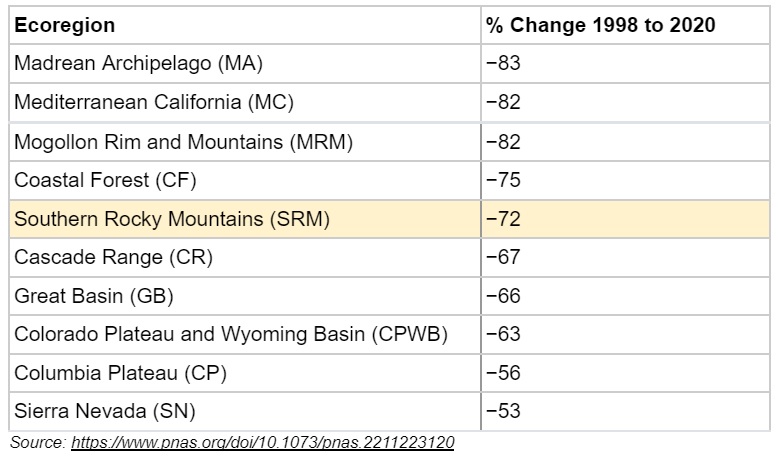DENVER– Environment Colorado is calling on state legislators to act to protect pollinators as new data shows that the once common western bumble bee is declining in Colorado’s Southern Rocky Mountains ecoregion at a rate of 72% from climate change, drought, and increased pesticide use, notably bee-killing pesticides called neonicotinoids (“neonics”). With Colorado’s legislature set to begin a review of the state’s Pesticide Applicators’ Act next week, pollinator advocates, experts, and the public are calling on legislators to restrict the use of bee-killing pesticides and stop the huge drop in pollinator populations.
The study, which was published in the Proceedings of the National Academy of Sciences, reveals that Colorado’s Southern Rocky Mountains ecoregion experienced the 5th highest rate of bumble decline of the western conterminous United States’s ecoregions.
Percent change in B. occidentalis (western bumble bee) occupancy from 1998 to 2020 and associated 95% credible intervals for each ecoregion in the western conterminous United States

“I have lived in Colorado for over 30 years and have noticed a definite increase in stressors in our more than 60 hives in the state,” said Free Range Beehives CEO and beekeeper Mike Rosol. “Average losses across Colorado last year were over 40%. As we lose more pollinators, a keystone species, we jeopardize our food systems and wildlife as a whole. I became a beekeeper because I know we need to take urgent action to mitigate threats to our pollinators in Colorado.”
“Bees are responsible for one in every three bites of food we eat including apples, almonds, avocados, blueberries, coffee, potatoes, pumpkins, tomatoes, Colorado’s Palisade peaches, the alfalfa that feeds our dairy cows, and so much more,” said Natalie Woodland, Save the Bees associate with Environment Colorado. “This study is stark and provides even more evidence that we urgently need to tackle neonic pesticides to protect our pollinators before it’s too late. Coloradans agree. We’ve collected nearly 24,000 petitions calling for action along with support letters from dozens of businesses, beekeepers and farmers.”
As the state with the fifth-most bee diversity, it is especially important to protect Colorado’s pollinators.
While the historic trends of bumble bee declines in this report are significant, future predictions are an even greater cause for concern. The report finds, in the western United States, “By the 2050s, [the] most optimistic scenario predicts occupancy declines in almost half of [the] ecoregions; more severe scenarios predict declines in all ecoregions ranging from 51 to 97%” for western bumble bees.”
The report also highlights that losing even a single common pollinator species can disrupt the entire pollinator networks, with abrupt consequences for the species that directly or indirectly rely on them for food, including humans which benefit from crop pollination services of $1.5 billion annually in the United States alone.
“We cannot take even the “common” species for granted. The western bumble bee was among the most common bumble bee species in the west, and now it is justifiably petitioned for listing under the endangered species act,” expressed Dr. John Mola, a Colorado-based researcher on this report and Assistant Professor in the Forest and Rangeland Stewardship department Colorado State University, who focuses especially on pollinator ecology. “What is common today may not be tomorrow – and stressors like neonicotinoid pesticides do not necessarily “care” whether a species is of conservation concern or considered a pest.”
“As Colorado considers reauthorizing the Pesticide Applicators Act in 2023, we’re calling on our legislators to take this moment to reduce the use of neonics because we can’t afford the trajectory we’re on for our food supply and our ecosystems,” adds Natalie Woodland, Save the Bees associate with Environment Colorado.
For more information on Environment Colorado’s Save the Bees campaign and to add your support, click here.
